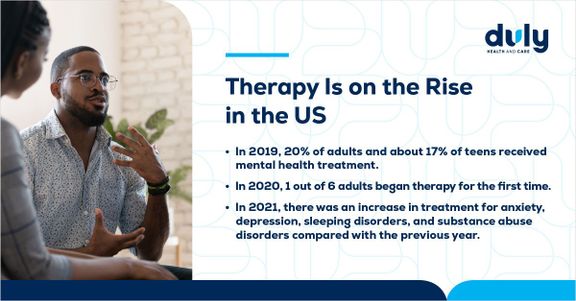When you’re in a relationship, you’ll do almost anything to support your partner. Whether it’s encouraging them to grow their career or helping them to make healthy lifestyle choices, there are a number of ways to show up for your partner.
One way is to help them prioritize their mental health through therapy. They might have experienced something traumatic (such as a job loss or the loss of a loved one), are struggling with a mental health condition (such as depression or anxiety), or benefit from the unbiased support of a mental health professional, the reasons to go therapy are nearly endless.
In recent years, many have caught on to the benefits of therapy, leading to an increase in its popularity.

Despite the increase in people going to therapy, not everyone recognizes — or is willing to admit — how beneficial it can be. In fact, almost half of Americans believe going to therapy is a sign of weakness. However, just a quarter have never been to a therapist, meaning that while the stigma around therapy still exists, people are going all the same.
Encouraging your partner to go to therapy can be challenging. They might be resistant to the idea of therapy or be in denial about their struggles. Here’s how you can talk to your partner about going to therapy in a loving and supportive way.
Come from a place of concern — not judgment.
If you think your partner would benefit from therapy, you’re hopefully focusing on their well-being. But they might not realize that, and they might feel judged instead of cared for.
Start your conversation by saying that you care about them, you want to see them happy, and you think therapy could help. Talk about what you’ve seen that worries you, such as that they’ve seemed sad, disinterested in activities they once enjoyed, or overwhelmed with worry. If you’ve noticed their symptoms impacting their life, such as at work, in their daily routine, or in your relationship, bring up those concerns, too.
Avoid judgmental statements, like saying that your partner has made your life difficult or that they should have been trying to get better on their own. This can make them feel attacked — leading them to feel defensive instead of supported and cared for.
Be mindful of when and where you talk about therapy.
Catching someone off guard about any important topic can be risky. If you want to broach the topic of therapy, choose a time and place that are conducive to productive conversations.
Rather than jumping into a discussion right when your partner comes home from work or just wakes up, talk to them when they’re relaxed and have plenty of time to discuss. You may also want to ask them about timing. Mention that you have something you want to discuss and get their input about a time that works for them.
As for location, make sure you have a private place where you won’t be interrupted by other family members or people in the vicinity. For instance, you might want to talk during a long car drive. This also helps avoid direct eye contact, helping your partner feel comfortable and less on the spot. However, if you think that a serious conversation in the close quarters of a car might make your partner uncomfortable, opt for another low-pressure situation. Remember — you know your partner and your relationship best.
Remain aware of stigmas, fears, and concerns about therapy.
While more people are getting the help they need through therapy, stigma and misconceptions about it remain. Some people view therapy as only being for people who are weak, while others feel it won’t be helpful. Some may also be hesitant about sharing intimate thoughts with a stranger.
If your partner sees therapy as being for people who are unable to help themselves, remind them that those who seek therapy are struggling with the same things plenty of others are — stress, major transitions, relationship concerns, and anxiety, to name a few. The difference is that they’re getting professional help.
What’s more, therapy is effective. About three-fourths of people who go to therapy get some benefit from it. If you’ve gone to therapy yourself, consider sharing your own experiences and how it’s helped you.
As for opening up to someone they aren’t familiar with, remind them that this is one of the benefits of going to therapy. Therapists don’t have any emotional stake in their clients’ lives, so they provide unbiased support. They’re also ethically and legally required to keep information shared during sessions completely confidential (with the exception of situations that might lead to someone getting hurt).
If your partner is still hesitant, encourage them to do their own research about therapy, including what to expect and how it might benefit them. They could also ask a trusted healthcare provider or friend who has gone to therapy for their insight.
Recognize your role in providing information — but don’t be pushy.
While you play an important role in helping your partner understand what therapy is and how it might help them, the choice is ultimately theirs. Not only could it be detrimental to your relationship to keep pushing the issue, but if they’re not open to the process, it may make therapy unproductive.
If your partner continues to resist the idea of therapy, you may need to let it go. If they know therapy is an option, they might come to terms with the idea on their own at a later time. In the meantime, focus on being a supportive partner as they work through the ups and downs of life and everything that comes along with it.
Health Topics:








